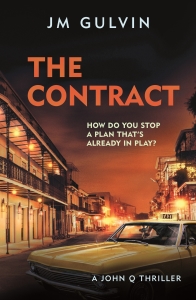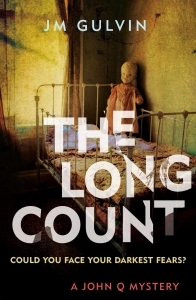The Contract – JM Gulvin
 The second novel in any crime fiction series if often a greater challenge for authors, and readers, than the first. The novelty effect wears off, there are expectations to be fulfilled and regular characters to be fleshed out and/or improved on. JM Gulvin, the author among others of the Ewan McGregor-Charley Boorman travel best-seller ‘Long Way Down’, produced the first John Q thriller, ‘The Long Count’, last year. The first investigation by gritty, laconic Texas Ranger John Quarrie was a hard act to follow, but the good news for crime fiction fans is that Gulvin has done a very fine job also with the second John Q novel, ‘The Contract’.
The second novel in any crime fiction series if often a greater challenge for authors, and readers, than the first. The novelty effect wears off, there are expectations to be fulfilled and regular characters to be fleshed out and/or improved on. JM Gulvin, the author among others of the Ewan McGregor-Charley Boorman travel best-seller ‘Long Way Down’, produced the first John Q thriller, ‘The Long Count’, last year. The first investigation by gritty, laconic Texas Ranger John Quarrie was a hard act to follow, but the good news for crime fiction fans is that Gulvin has done a very fine job also with the second John Q novel, ‘The Contract’.
He has written a convincing story, building on the first novel’s strengths and creating an ambitious plot which tackles, from a new, sideways but highly original angle, what is arguably the mother of all the USA’s XXth century conspiracy theories . All of this while keeping the focus firmly on John Q: an old-school Texas Ranger, a Korean war veteran (the series is set in the late 1960s) with a gun on each hip and quick to the draw, yet at the same time a compassionate and highly moral individual, endearingly deadpan and determined as hell.
While ‘The Long Count’ was rooted in John Q’s home patch, Texas, ‘The Contract’ takes him to 1967 New Orleans. Not so distant in geographical terms, but a far cry indeed in terms of attitudes and culture – both of them as skilfully portrayed by Gulvin as the Texan locale was in the first novel.
John Q heads for New Orleans to investigate a crime which originates on his own backyard, after a man is found dead, apparently of natural causes, in a local hotel. No identity, the hotel bill paid in cash. In the dead man’s room John Q finds an empty bottle of the drug Proloid, the prescription written by a New Orleans chemist. His detective instincts are tickled, especially since the mysterious death might be linked to another local crime he’s been involved with on the same day. Two robbers hit an arms store on sleepy Deacon’s Mount’s Main Street, John Q is called to the site, gives chase and corners the robbers, and one of them is foolish enough to provoke the Ranger to a shoot-out. The robber ends up dead, and John Q finds out from his partner in crime that the robber spent the previous night at the same hotel as the unidentified dead man.
Gulvin cleverly weaves into this opening a parallel and even more sinister strand: the arms robbery is watched and perhaps controlled by an enigmatic character, Franklin, who could be anything from the CIA to law enforcement to a gangster. And who, it turns out, is closely connected to powerful, wealthy New Orleans attorney Rosslyn F Tobie. Inevitably, John Q is drawn to the Louisiana city, where he pursues his own investigation while having to dodge the attention of the NOPD and the city DA, both of them not particularly keen to help the Texas Ranger out.
Gulvin develops a fascinating New Orleans side of the story by introducing a string of interesting local characters, young jazz singer Gigi Matisse and her grandmother Nana – an unlikely old friend of Rosslyn F Tobie – chief among them, and by steeping the narrative in the languid atmosphere of the Cajun capital.
The characters are finely drawn, as is the underlying racial and social tension that was undoubtedly a feature in the American South in the 1960s and is never far from the surface of the narrative, giving a compelling, disturbing relevance to the story.
The plot is devious in its layering, and Gulvin does an excellent job at making it tangled enough to keep readers on their toes, even if it means, in the first third of the novel, he needs to be very cagey about what is going on, at times downright secretive. While John Q takes serious risks in New Orleans to get to the bottom of the unidentified man’s death, a clock is ticking: a count-down to some unspecified criminal act masterminded by Franklin and, apparently, Rosslyn F Tobie, which ties in with the death John Q is investigating. We will only learn at the very end what the act, the contract the title refers to, was, and it is a stunning revelation, one that on balance was well worth the wait.
‘The Contract’ is a mean follow-up to the ‘The Long Count’, and JM Gulvin hits bullseye on plot, characters and style. His writing is pared-down yet atmospheric, with echoes of Elmore Leonard and even Cormack McCarthy. The year 1967 was actually half a century ago, and investigative methods were quaintly low-tech compared to now, but Gulvin succeeds in both immersing the reader in the mood and realities of the time, and in not making them a hindrance to contemporary readers’ enjoyment of the story. A ten gallon hat off to both author and John Q, as we eagerly await for a third instalment in the series.




